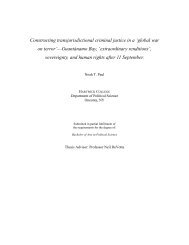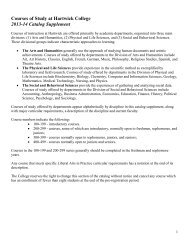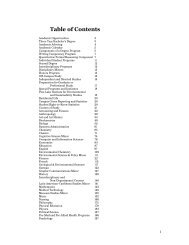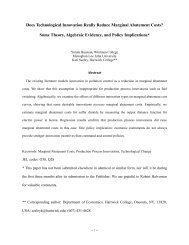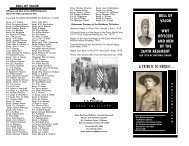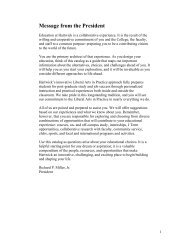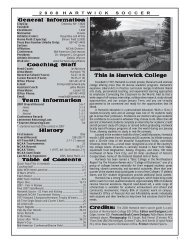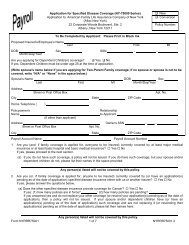Table of Contents - Hartwick College
Table of Contents - Hartwick College
Table of Contents - Hartwick College
You also want an ePaper? Increase the reach of your titles
YUMPU automatically turns print PDFs into web optimized ePapers that Google loves.
construction <strong>of</strong> the drug war, and Irish culture and society. More than one topic<br />
may be taken for credit. Prerequisite: Soci 105 or as specified. (SBA)<br />
251 Race and Ethnicity (3 credits) This course examines racial and<br />
ethnic relations in American society. What structural factors allowed for<br />
the relative success <strong>of</strong> some groups while denying the success <strong>of</strong> others?<br />
What roles have racism, prejudice and discrimination played in the<br />
American experience? Current issues in U.S. race/ethnic relations also are<br />
explored. Prerequisite: another sociology course. (SBA)<br />
301 Criminology (3 credits) This course examines criminal behavior and the<br />
measures intended to control it. Major emphasis is placed upon social factors<br />
that contribute to such behavior, and criminal justice system efforts to combat<br />
criminal behavior. Attention is also given to current trends in criminal behavior<br />
and criminal justice, and the evaluation <strong>of</strong> these from the perspective <strong>of</strong> different<br />
sociological theories. Prerequisite: another sociology course. (SBA)<br />
304 Urban Sociology (3 credits) An analysis <strong>of</strong> the contemporary<br />
American city and cities worldwide with emphasis placed upon the nature<br />
<strong>of</strong> urban development; urban social problems; and the constellation <strong>of</strong><br />
interests, groups, and processes that operate in urban settings. Prerequisite:<br />
another sociology course. (SBA)<br />
310 Classical Social Theory (4 credits) This course is a critical history <strong>of</strong><br />
sociological theory with a focus on the work <strong>of</strong> Marx, Weber, Durkheim,<br />
Simmel, Gilman, and Dubois. In the most basic terms, a social theory<br />
simply is a systematic series <strong>of</strong> propositions that are used with social<br />
scientific methods to help us understand social problems that are a reality<br />
<strong>of</strong> our daily existence, quite unconfined by the classroom. Social theory<br />
can help us to comprehend the dynamics <strong>of</strong> these problems and suggest<br />
ways to resolve them. When divorced from social problems, theory can<br />
seem rather dry or artificial, so throughout the course we will use classical<br />
social theory to analyze contemporary social problems to make clear why<br />
“Sociology is a basic survival skill.” Prerequisite: Soci 105. (SBA)<br />
311 Juvenile Delinquency (3 credits) This course <strong>of</strong>fers an introductory<br />
survey <strong>of</strong> the study <strong>of</strong> juvenile delinquency and the Juvenile Justice system in the<br />
U.S. Crucial to this examination is a framework based upon the understanding <strong>of</strong><br />
two central issues: the social definition <strong>of</strong> adolescent years in American society,<br />
and how the justice system treats behavior which society views as unacceptable or<br />
deviant. To this end, this course focuses on: the social status <strong>of</strong> juveniles <strong>of</strong><br />
different status positions and the <strong>of</strong>ten conflicting expectations and opportunities<br />
for those adolescents in contemporary American society, the operation <strong>of</strong> the<br />
juvenile justice system in the formal and informal decision making and<br />
processing <strong>of</strong> that form <strong>of</strong> juvenile behavior broadly defined as “delinquency,”<br />
current dimensions and trends, differing major theoretical perspectives which<br />
have been developed to explain juvenile delinquency, and the range <strong>of</strong> options<br />
society has available to help prevent, treat, and/or punish “delinquent” behavior.<br />
Prerequisite: another sociology course. (SBA)<br />
321 Introduction to Social Work (4 credits) Social welfare public policy is<br />
undergoing the most significant change since the New Deal. These changes are<br />
based upon competing ideas about the nature <strong>of</strong> individual and community<br />
responsibility. This course explores these ideas to uncover their underlying<br />
assumptions, value properties and social impacts on the lives <strong>of</strong> individuals,<br />
groups and communities. To aid in this understanding, this course examines<br />
major social concerns including poverty, violence, alcohol and other drug use,<br />
227



